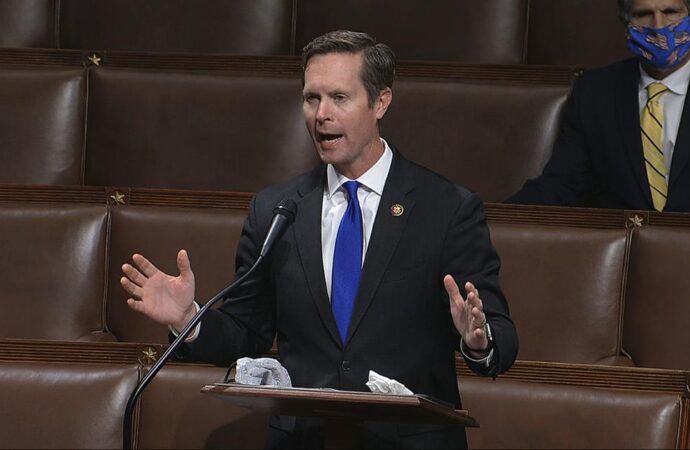Rep. Davis: Biden infrastructure plan to get ‘zero support’ from GOP as is U.S. Rep. Rodney Davis is interviewed in his Decatur office in this Jan. 12 file photo. CLAY JACKSON, HERALD & REVIEW BRENDEN MOORE U.S. Rep. Rodney Davis talks infrastructure at the Decatur Regional Chamber of Commerce business breakfast on April 7, 2021.
Rep. Davis: Biden infrastructure plan to get ‘zero support’ from GOP as is

U.S. Rep. Rodney Davis is interviewed in his Decatur office in this Jan. 12 file photo.
U.S. Rep. Rodney Davis talks infrastructure at the Decatur Regional Chamber of Commerce business breakfast on April 7, 2021.
DECATUR — U.S. Rep. Rodney Davis, R-Taylorville, said Wednesday that President Joe Biden’s massive $2.3 trillion infrastructure plan would get “zero support” from Republican lawmakers should the president attempt to pass it through the budget reconciliation process.
Davis also addressed the once-a-decade redistricting process, which could endanger his future as a member of Congress depending upon how Democrats in the General Assembly, who have complete control over the process, lay out the new district lines.
Speaking before a Decatur Regional Chamber of Commerce event at the Decatur Club on Wednesday, Davis said more spending on infrastructure like roads, bridges and waterways was necessary.
However, he criticized the Biden Administration’s proposal as “a new Green Deal policy-laden bill under a catchy title of infrastructure,” saying it goes beyond the scope of traditional infrastructure and that it was “woefully underfunded on what we consider true infrastructure.”
There is no disagreement from Democrats that the proposal reimagines the meaning of infrastructure.
In fact, the single largest piece of Biden’s proposal is a $400 billion plan to expand access to caregiving for the elderly and disabled. Another nontraditional infrastructure item includes spending $174 billion to boost the electric vehicle market.
About $115 billion in Biden’s plan is dedicated to roads and bridges, $85 billion to public transportation, $80 billion to railways, $25 billion to airports and $17 billion for inland ports and waterways.
Though Biden said he would prefer that an infrastructure package be bipartisan, many expect the legislation to go through the budget reconciliation process. This would allow Democrats, who control an evenly-divided U.S. Senate with Vice President Kamala Harris’ tiebreaking vote, to advance the legislation with 51 votes instead of the 60 needed for most bills.
However, Davis said use of that process would only make the legislation more partisan and kill any chance of a package receiving Republican votes.
PHOTOS: U.S. Rep. Rodney Davis
gabbys-law-080520-5.jpg (copy)
U.S. Rep. Rodney Davis is shown on Aug. 4.
gabbys-law-080520-6.jpg
U.S. Representative Rodney Davis discusses “Gabby’s Law,” a proposed federal law to require all U.S. hospitals to improve and maintain sepsis protocols, on Tuesday morning at Gabby’s Gazebo in Monticello.
Rodney_Davis-Macon-062420-005.JPG
Rachel Bolsen, center, administrator for the Eastern Star Home in Macon, receives a donation of personal protective equipment from Gordy Hulten, left, and U.S. Rep. Rodney Davis, R-Taylorville, on Tuesday.
U.S. Rep. Rodney Davis, R-Taylorville
U.S. Rep. Rodney Davis, R-Taylorville, speaks after a roundtable at the Crossing Healthcare Campus with government officials about coronavirus.
082119-blm-loc-1chamber
Republican U.S. Reps. Rodney Davis of Taylorville, left, and Darin LaHood of Dunlap talk about trying to build bipartisan legislation during the McLean County Chamber of Commerce’s State of Congress event Aug. 20 at the Holiday Inn & Suites Bloomington-Airport in Bloomington.
Caulkins_Dan 2 7.29.19.JPG
State Rep. Dan Caulkins, R-Decatur., center, answers a question with d U.S. Rep. Rodney Davis, R-Taylorville, on Monday during the “Open Government Nights” in the Shilling Community Education Center on the campus of Richland Community College.
Davis_Rodney 2 07.29.19.JPG
U.S. Rep. Rodney Davis, R-Taylorville answers a question alongside state Rep. Dan Caulkins, R-Decatur, on Monday during Open Government Night at Richland Community College.
DAVIS
In the image taken from a CSPAN video, Congressman Rodney Davis, R-Taylorville, speaks on the floor of the U.S. House on Thursday. Two lawmakers briefly debated the merits of the band Nickelback.
Rodney Davis at CIRA III
U.S. Rep. Rodney Davis answers questions prior to a tour of the Central Illinois Regional Airport in Bloomington on Monday, Feb. 4, 2019. Davis met with employees affected by the recent government shutdown.
Rodney Davis at CIRA I
Brian Armstrong, left, a TSA agent from Bloomington, visits with U.S. Rep. Rodney Davis Monday at the Central Illinois Regional Airport in Bloomington. Davis toured the airport with Executive Director Carl Olson to talk with employees affected by the recent federal government shutdown.
Election 2018-Illinois-Congress-Pence
Vice President Mike Pence, right, campaigns with U.S. Rep. Rodney Davis, R-Taylorville, at Panther Creek Country Club in Springfield on Oct. 12.
103018-blm-loc-2davisdebate
13th Congressional District challenger Betsy Dirksen Londrigan, D-Springfield, left, laughs as incumbent U.S. Rep. Rodney Davis, right, R-Taylorvillle, makes a point during a debate for the seat Monday, Oct. 29, 2018, at the Normal Theater in Normal. Davis was first elected to the seat in 2012. Recent polls show Davis to have a slim lead in the race but he could be vulnerable depending on turnout.
092514-blm-loc-1davis
Former Vice Presidential candidate Paul Ryan, left, stumps for U.S. Representative Rodney Davis during a campaign stop in Bloomington on Wednesday. Ryan and Davis, right, were also joined by Congressman Aaron Schock and former Congressman Tom Ewing. Ryan called Davis, who is facing Democratic challenger Ann Callis, one of the hardest working members of Congress.
Rodney Davis Press Conference
U.S. Rep. Rodney Davis is seen with Winnie Feken, owner of Chuck’s Harley-Davidson in Bloomington, and Kim Maisch, state director of the National Federation of Independent Businesses, on Wed., Aug. 21, 2014.
“It takes our ability to negotiate on what we think is best for our districts when they take a partisan route,” Davis said. “We implore the administration not to do that.”
“It’s going to take a discussion where we want to talk about how we get (U.S. Route 51) done, we want to talk about how we get Brush College Road, we want to talk about the other projects that are important to this area,” he said. “But instead, what’s going to happen is one side in Washington is going to negotiate with each other. And the bill is going to get costlier. And (there’s going to be) more regulatory intervention.”
To partially pay for the plan, the Biden Administration has proposed raising the corporate tax rate from 21% to 28%, which is still lower than the 35% prior to the tax cuts signed into law by former President Donald Trump in 2017.
“The ‘pay-fors’ that the administration is proposing is the worst possible thing that can happen as our small businesses come out of this pandemic,” Davis said.
Davis, who blamed Democratic Congressional leadership for the apparent turn to reconciliation, held out hope that Biden would reverse course. But, he said it will remain a partisan fight for now.
“Infrastructure right now is about to become entertainment value, and that’s very disappointing to me because it’s too important of an issue to get caught up in what I would consider the polar ends of the political spectrum that we see right now in our country,” Davis said.
Also at Wednesday’s event, Davis said he was “begging and pleading” with Democrats in the General Assembly to draw a fair map that keeps Macon County intact.
Davis’ district, which includes portions of Bloomington-Normal, Champaign-Urbana, Metro East, Springfield and the rural areas in between, currently includes all of Macon County.
He said he is “not concerned at all” at what Democrats might do to his district, noting that the party has tried unsuccessfully to defeat him each election cycle since 2012.
“If you look at my district, you can see there’s a distinct political reason why there are four public universities in my district, four private universities in my district and we touch eight community college districts,” Davis said, noting precision in which his district was crafted.
But with Illinois expected to lose a congressional seat following the 2020 U.S. Census and with the opportunity to consolidate more Democratic-leaning areas in Metro East, Democrats might have their best chance to knock out Davis.
“They understand who I am and they understand that we understand that they have complete control over the redistricting process,” Davis said. “I can’t worry about that. We’ll let the chips fall where they may and figure out what the next step is.”
U.S. Rep Rodney Davis
PHOTOS: U.S. Rep. Rodney Davis
gabbys-law-080520-5.jpg (copy)
U.S. Rep. Rodney Davis is shown on Aug. 4.
gabbys-law-080520-6.jpg
U.S. Representative Rodney Davis discusses “Gabby’s Law,” a proposed federal law to require all U.S. hospitals to improve and maintain sepsis protocols, on Tuesday morning at Gabby’s Gazebo in Monticello.
Rodney_Davis-Macon-062420-005.JPG
Rachel Bolsen, center, administrator for the Eastern Star Home in Macon, receives a donation of personal protective equipment from Gordy Hulten, left, and U.S. Rep. Rodney Davis, R-Taylorville, on Tuesday.
U.S. Rep. Rodney Davis, R-Taylorville
U.S. Rep. Rodney Davis, R-Taylorville, speaks after a roundtable at the Crossing Healthcare Campus with government officials about coronavirus.
082119-blm-loc-1chamber
Republican U.S. Reps. Rodney Davis of Taylorville, left, and Darin LaHood of Dunlap talk about trying to build bipartisan legislation during the McLean County Chamber of Commerce’s State of Congress event Aug. 20 at the Holiday Inn & Suites Bloomington-Airport in Bloomington.
Caulkins_Dan 2 7.29.19.JPG
State Rep. Dan Caulkins, R-Decatur., center, answers a question with d U.S. Rep. Rodney Davis, R-Taylorville, on Monday during the “Open Government Nights” in the Shilling Community Education Center on the campus of Richland Community College.
Davis_Rodney 2 07.29.19.JPG
U.S. Rep. Rodney Davis, R-Taylorville answers a question alongside state Rep. Dan Caulkins, R-Decatur, on Monday during Open Government Night at Richland Community College.
DAVIS
In the image taken from a CSPAN video, Congressman Rodney Davis, R-Taylorville, speaks on the floor of the U.S. House on Thursday. Two lawmakers briefly debated the merits of the band Nickelback.
Rodney Davis at CIRA III
U.S. Rep. Rodney Davis answers questions prior to a tour of the Central Illinois Regional Airport in Bloomington on Monday, Feb. 4, 2019. Davis met with employees affected by the recent government shutdown.
Rodney Davis at CIRA I
Brian Armstrong, left, a TSA agent from Bloomington, visits with U.S. Rep. Rodney Davis Monday at the Central Illinois Regional Airport in Bloomington. Davis toured the airport with Executive Director Carl Olson to talk with employees affected by the recent federal government shutdown.
Election 2018-Illinois-Congress-Pence
Vice President Mike Pence, right, campaigns with U.S. Rep. Rodney Davis, R-Taylorville, at Panther Creek Country Club in Springfield on Oct. 12.
103018-blm-loc-2davisdebate
13th Congressional District challenger Betsy Dirksen Londrigan, D-Springfield, left, laughs as incumbent U.S. Rep. Rodney Davis, right, R-Taylorvillle, makes a point during a debate for the seat Monday, Oct. 29, 2018, at the Normal Theater in Normal. Davis was first elected to the seat in 2012. Recent polls show Davis to have a slim lead in the race but he could be vulnerable depending on turnout.
092514-blm-loc-1davis
Former Vice Presidential candidate Paul Ryan, left, stumps for U.S. Representative Rodney Davis during a campaign stop in Bloomington on Wednesday. Ryan and Davis, right, were also joined by Congressman Aaron Schock and former Congressman Tom Ewing. Ryan called Davis, who is facing Democratic challenger Ann Callis, one of the hardest working members of Congress.
Rodney Davis Press Conference
U.S. Rep. Rodney Davis is seen with Winnie Feken, owner of Chuck’s Harley-Davidson in Bloomington, and Kim Maisch, state director of the National Federation of Independent Businesses, on Wed., Aug. 21, 2014.


























Leave a Comment
Your email address will not be published. Required fields are marked with *